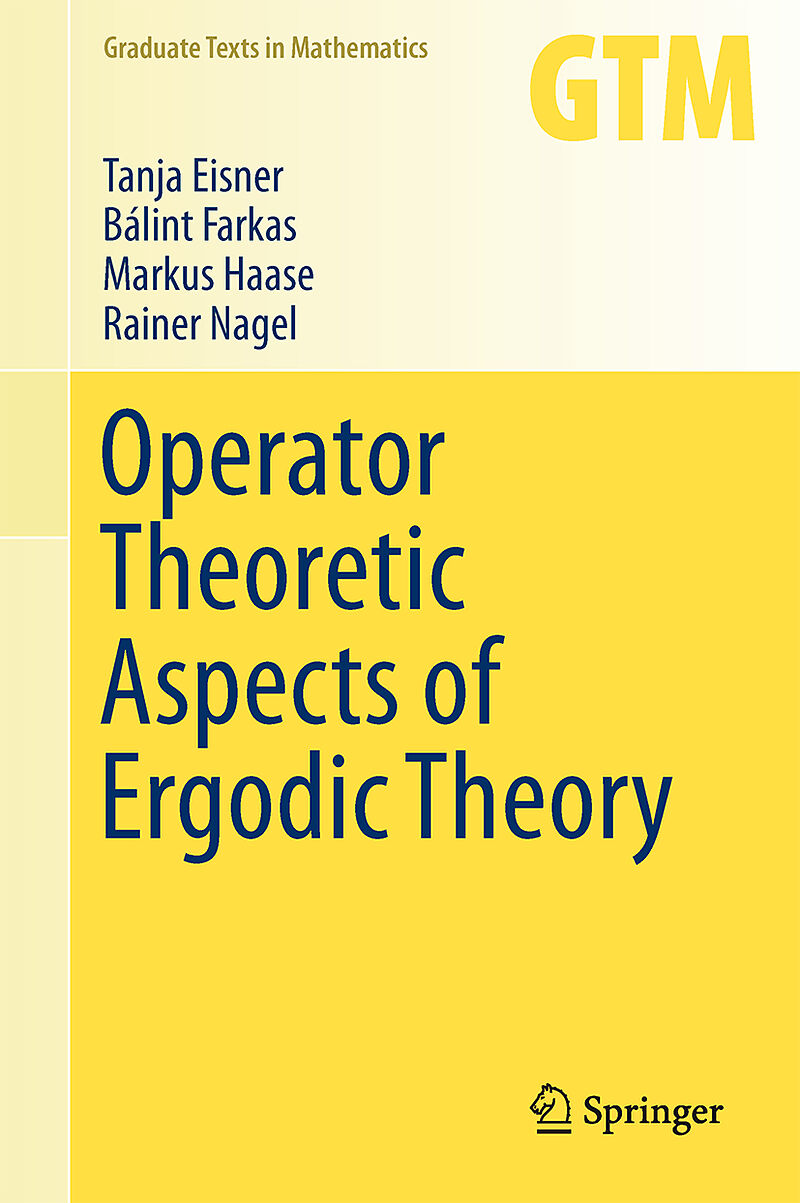Operator Theoretic Aspects of Ergodic Theory
Einband:
Fester Einband
EAN:
9783319168975
Untertitel:
Graduate Texts in Mathematics 272
Genre:
Mathematik
Autor:
Tanja Eisner, Rainer Nagel, Markus Haase, Bálint Farkas
Herausgeber:
Springer International Publishing
Auflage:
1st ed. 2015
Anzahl Seiten:
648
Erscheinungsdatum:
28.11.2015
ISBN:
3319168975
Stunning recent results by HostKra, GreenTao, and others, highlight the timeliness of this systematic introduction to classical ergodic theory using the tools of operator theory. Assuming no prior exposure to ergodic theory, this book provides a modern foundation for introductory courses on ergodic theory, especially for students or researchers with an interest in functional analysis. While basic analytic notions and results are reviewed in several appendices, more advanced operator theoretic topics are developed in detail, even beyond their immediate connection with ergodic theory. As a consequence, the book is also suitable for advanced or special-topic courses on functional analysis with applications to ergodic theory.
Topics include:
• an intuitive introduction to ergodic theory
• an introduction to the basic notions, constructions, and standard examples of topological dynamical systems
• Koopman operators, Banach lattices, lattice and algebra homomorphisms, and the GelfandNaimark theorem
• measure-preserving dynamical systems
• von Neumann's Mean Ergodic Theorem and Birkhoff's Pointwise Ergodic Theorem
• strongly and weakly mixing systems
• an examination of notions of isomorphism for measure-preserving systems
• Markov operators, and the related concept of a factor of a measure preserving system
• compact groups and semigroups, and a powerful tool in their study, the Jacobsde LeeuwGlicksberg decomposition
• an introduction to the spectral theory of dynamical systems, the theorems of Furstenberg and Weiss on multiple recurrence, and applications of dynamical systems to combinatorics (theorems of van der Waerden, Gallai,and Hindman, Furstenberg's Correspondence Principle, theorems of Roth and FurstenbergSárközy)
Beyond its use in the classroom, Operator Theoretic Aspects of Ergodic Theory can serve as a valuable foundation for doing research at the intersection of ergodic theory and operator theory
Treats both classical and recent results in ergodic theory from a modern analytic perspective Assumes no background in ergodic theory, while providing a review of basic results in functional analysis Provides a foundation for understanding recent applications of ergodic theory to combinatorics and number theory
Autorentext
Tanja Eisner is a Professor of Mathematics at the University of Leipzig. Bálint Farkas is a Professor of Mathematics at the University of Wuppertal. Markus Haase is a Professor of Mathematics at the Delft Institute of Applied Mathematics. Rainer Nagel is a Professor of Mathematics at the University of Tübingen.
Inhalt
What is Ergodic Theory?.- Topological Dynamical Systems.- Minimality and Recurrence.- The C*-algebra C(K) and the Koopman Operator.- Measure-Preserving Systems.- Recurrence and Ergodicity.- The Banach Lattice Lp and the Koopman Operator.- The Mean Ergodic Theorem.- Mixing Dynamical Systems.- Mean Ergodic Operators on C(K).- The Pointwise Ergodic Theorem.- Isomorphisms and Topological Models.- Markov Operators.- Compact Semigroups and Groups.- Topological Dynamics Revisited.- The Jacobsde LeeuwGlicksberg Decomposition.- Dynamical Systems with Discrete Spectrum.- A Glimpse at Arithmetic Progressions.- Joinings.- The HostKraTao Theorem.- More Ergodic Theorems.- Appendix A: Topology.- Appendix B: Measure and Integration Theory.- Appendix C: Functional Analysis.- Appendix D: The Riesz Representation Theorem.- Appendix E: Theorems of Eberlein, Grothendieck, and Ellis.

Leider konnten wir für diesen Artikel keine Preise ermitteln ...
billigbuch.ch sucht jetzt für Sie die besten Angebote ...
Die aktuellen Verkaufspreise von 6 Onlineshops werden in Realtime abgefragt.
Sie können das gewünschte Produkt anschliessend direkt beim Anbieter Ihrer Wahl bestellen.
Loading...
Die aktuellen Verkaufspreise von 6 Onlineshops werden in Realtime abgefragt.
Sie können das gewünschte Produkt anschliessend direkt beim Anbieter Ihrer Wahl bestellen.
| # | Onlineshop | Preis CHF | Versand CHF | Total CHF | ||
|---|---|---|---|---|---|---|
| 1 | Seller | 0.00 | 0.00 | 0.00 |
